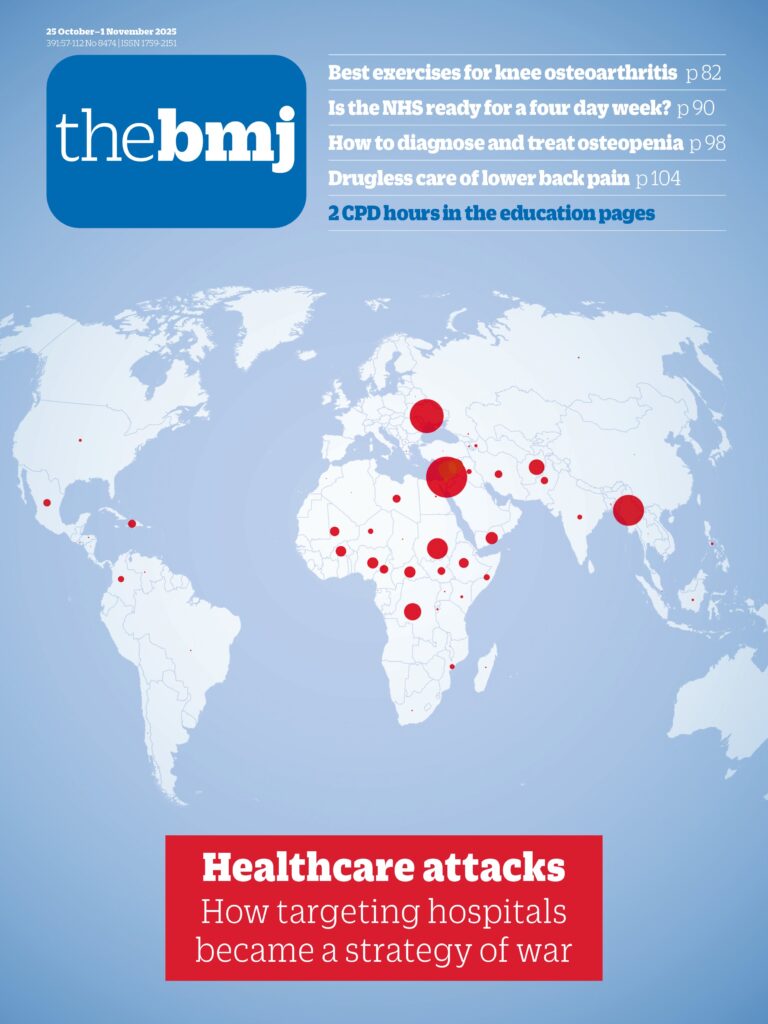From small daily adjustments to influencing national policy, doctors can make a difference, Elisabeth Mahase hears
Make realistic suggestions
Veena Aggarwal, co-chair of the Royal College of General Practitioners’ climate and sustainability group, says, “Greener practice is something I am passionate about. My first piece of advice to any healthcare professionals looking to act on climate change in their work is to make your thoughts known and start conversations in your workplace.
“Talk to the GP partners and managers at your practice or the leadership team of your hospital and ask them what they’re already doing on sustainability. Ensure you go into any meetings prepared, knowing what your ambitions are and ready to make thought out and realistic suggestions. Using case studies of best practice or innovation can strengthen your argument for sustainable improvements, many of which you can find on the Greener NHS or Centre for Sustainable Healthcare websites.
“Sustainability can also be embedded into your everyday clinical practice, such as prescribing more environmentally friendly inhalers, deprescribing drugs when clinically appropriate, or only using disposable gloves when they’re really needed.
“You can also consider taking up a fellowship, either full time or part time, such as the chief sustainability officer’s clinical fellow scheme.1 This is a unique chance to focus on sustainability in healthcare and influence real change from the inside. Fellowships have also been known to lead to other opportunities and connections that can help you tie sustainability into your future career.
“Finally, remember to use your voice. As doctors, we have a platform and are lucky to be trusted figures in our communities. Effective campaigning can take many forms, from writing to your MP and campaigning at a local level, to joining climate focused groups and networks.”
Reduce unnecessary care
Bethan Griffith, consultant acute physician, says, “My patients in acute care are already experiencing the direct consequences of climate change.
“Heatwaves increase hospital admissions, particularly among vulnerable populations, contributing to higher morbidity and mortality—from falls and delirium to acute kidney injuries.2 The Society for Acute Medicine’s hot weather health plan provides guidance for mitigating these impacts, but mitigation is only a temporary measure. We are responsible for 4% of the UK’s total greenhouse gas emissions,3 and we need to act proactively on climate change.
“Reducing unnecessary care is one of the most powerful levers available to us as clinicians. Unnecessary tests, over-investigation, and redundant interventions not only expose patients to potential harm but also drive considerable environmental impact. Every test, imaging study, and hospital day consumes energy, produces waste, and uses resources, which comes at environmental and financial cost. Importantly, minimising low value interventions also corresponds with high quality care: it reduces iatrogenic harm, shortens admissions, and improves patient experience.
“Climate conscious care does not require large scale overhauls; incremental, thoughtful actions in routine practice make a tangible difference. Small, focused improvement projects, guided by tools like the sustainable quality improvement framework,4 can incorporate environmental impact alongside clinical outcomes. It allows clinicians to visualise the broader difference they can make using the ‘triple bottom line’—simultaneously assessing the financial, social, and environmental return on their investment.
“Practical, evidence based examples include admission avoidance pathways, such as early oral switches for intravenous antibiotics, and considering the carbon footprint of plastic, fluids, and cannulas. Can you reduce your daily c-reactive protein requests or cut down your use of non-sterile gloves?
“By embedding these principles of streamlining care into daily practice, we can protect patients and the planet. By recognising that Earth has finite resources, you can take action by turning everyday clinical decisions into meaningful climate action.”
Talk to anyone who will listen
Anandita Pattnaik, public health doctor, says, “During the covid-19 pandemic lockdown I enrolled in an online course with HarvardX which opened my eyes to the wide ranging health impacts of climate change. As a fresh medical graduate I was surprised by how little I knew, and one line stuck with me: ‘Those who are least responsible for the climate crisis bear the maximum brunt of it.’
“I began exploring the situation of small island developing states like Kiribati. Not only do the people there face losing their homeland to rising sea levels, they are also having to deal with groundwater salinisation which increases their risk of hypertension. Connecting these dots made it clear to me that urgent climate action is critical, but also the power that health professionals have in speaking up.
“From that point on I was determined to educate my peers and future medical graduates about the relevance of climate change to health. I joined the Planetary Health Report Card5 to evaluate the content that two medical schools in India, including the one I attended, provided to health professionals in training. I’ve also worked with the World Health Organization to develop guidance on building climate resilient healthcare facilities, and with the UK Health Alliance on Climate Change as a policy officer.
“The health argument can push real action. Doctors are among the most trusted professions in the UK and across the world. The most powerful way to fight climate change is to use our voices. Talk about the health impacts of the crisis and highlight actions that bring the greatest health benefits. Speak to your peers, colleagues, friends, patients, and especially your MP—basically anyone who will listen. You might be shocked at how little people know. The more people understand and support climate action, the closer we get to keeping the Earth healthy and habitable for future generations.”

